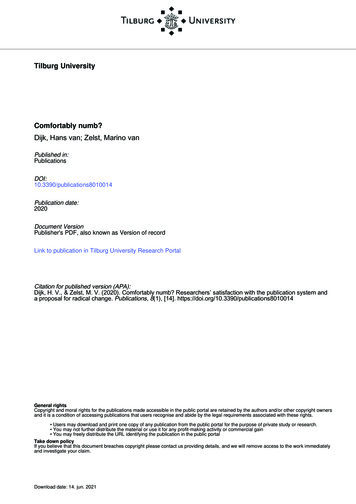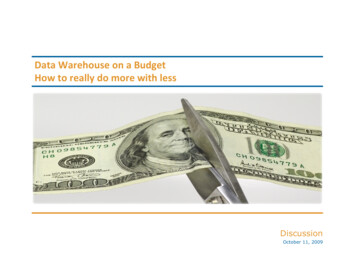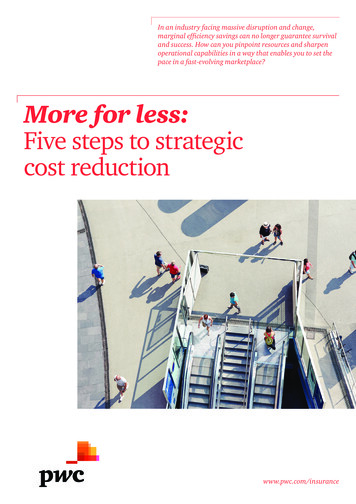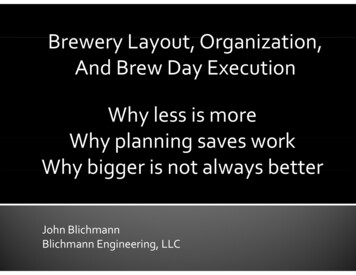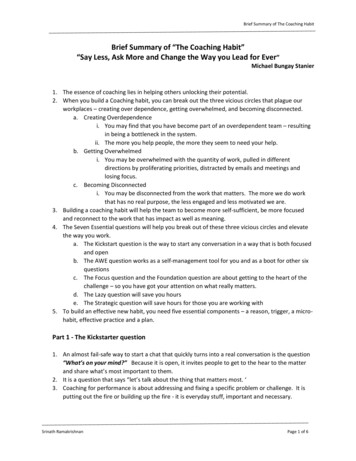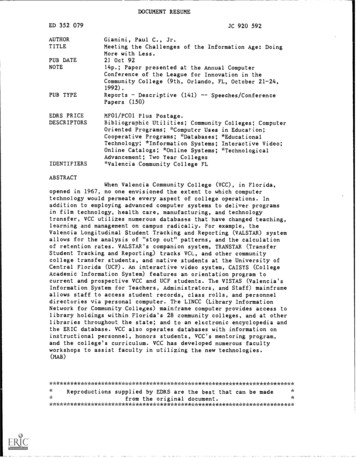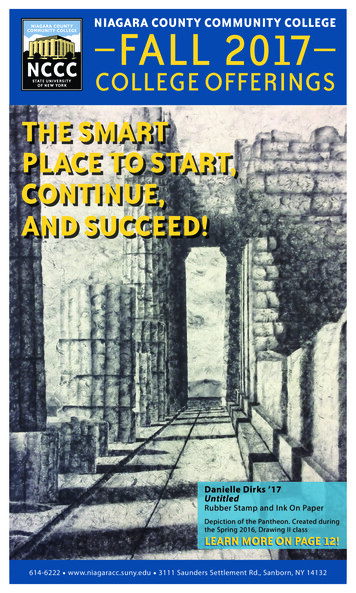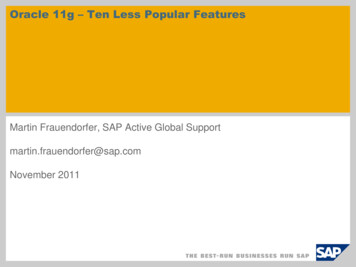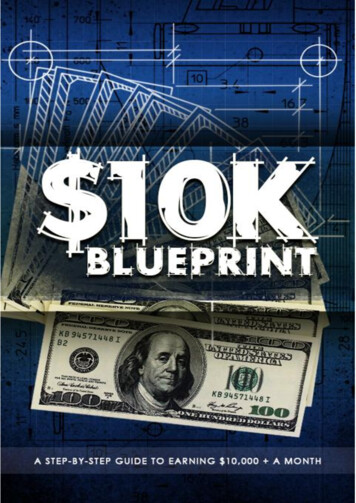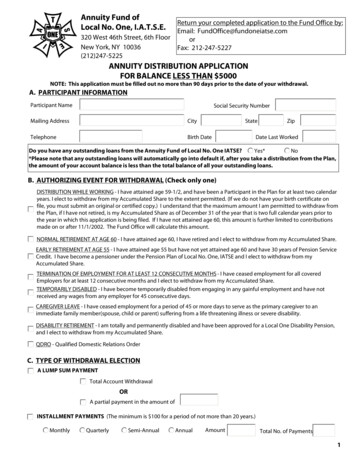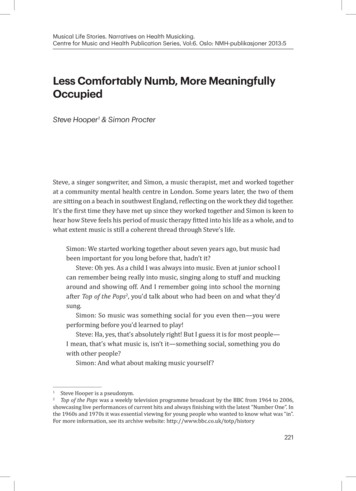
Transcription
Musical Life Stories. Narratives on Health Musicking.Centre for Music and Health Publication Series, Vol:6. Oslo: NMH-publikasjoner 2013:5Less Comfortably Numb, More MeaningfullyOccupiedSteve Hooper1 & Simon ProcterSteve, a singer songwriter, and Simon, a music therapist, met and worked togetherat a community mental health centre in London. Some years later, the two of themare sitting on a beach in southwest England, reflecting on the work they did together.It’s the first time they have met up since they worked together and Simon is keen tohear how Steve feels his period of music therapy fitted into his life as a whole, and towhat extent music is still a coherent thread through Steve’s life.Simon: We started working together about seven years ago, but music hadbeen important for you long before that, hadn’t it?Steve: Oh yes. As a child I was always into music. Even at junior school Ican remember being really into music, singing along to stuff and muckingaround and showing off. And I remember going into school the morningafter Top of the Pops2, you’d talk about who had been on and what they’dsung.Simon: So music was something social for you even then—you wereperforming before you’d learned to play!Steve: Ha, yes, that’s absolutely right! But I guess it is for most people—I mean, that’s what music is, isn’t it—something social, something you dowith other people?Simon: And what about making music yourself?Steve Hooper is a pseudonym.Top of the Pops was a weekly television programme broadcast by the BBC from 1964 to 2006,showcasing live performances of current hits and always finishing with the latest “Number One”. Inthe 1960s and 1970s it was essential viewing for young people who wanted to know what was “in”.For more information, see its archive website: http://www.bbc.co.uk/totp/history12221
Steve Hooper & Simon ProcterSteve: Well, I played air-guitar for years! When I was growing up I hadan older cousin who had some guitar lessons at his school, and the idea washe was going to show me what he’d learned but that’s easier said than donereally. So I learned a couple of chords on the guitar and that was it. And I wasvery shy really—I never really had the confidence to do anything. I didn’tactually learn to play the guitar until I was eighteen, maybe nineteen. I musthave had about a dozen lessons, and that gave me the tools to go away andlearn more of the guitar myself.Simon: And how did you get on with that?Steve: Well, I think I’d already got the hang of strumming from all thoseyears of playing air-guitar! I needed to learn much more about what to dowith my left hand. And then there was finger-picking: one thing I reallyremember learning when I was young, it must be one of the first songs guitarplayers everywhere learn, was The House of the Rising Sun. That basic fingerpicking pattern is the same on so many songs. So yes, I’d always been intomusic. I was just too shy to do anything about it until I was about 18 or 19.Simon: So what happened then?Steve: That’s when I joined a band, which is of course what I’d reallywanted to do. I think most people do who learn the guitar. We ended upmoving away from here to London to ‘make it’, but that fell apart quitequickly and my music died away with it really, like it does.Simon: Hmm, yes. People tend to think of music and playing in bands assomething for teenagers really, don’t they?Steve: Yes, that kind of attitude seemed normal to me then—that whenyou grow up you leave things like music behind. But now that seems daft!Simon: So what happened in London?Steve: Well, from about my mid-twenties to my mid-thirties I did verylittle musically. I worked in a dole office3 for years: I was a union rep and itwas all very pressured. Things got out of control: I was drinking too much,smoking too much dope, taking too many pills to try to cope with everything,and it all ended in a breakdown. And it was round about that time that Istarted writing songs. It sounds funny now but I’d never really written songswhen I’d been in bands years before, and looking back it’s clear that eachtime I had a breakdown—there were two—I got back into music. I think itwas a way of dealing with all those pent-up emotions and chaotic thingsA dole office is where unemployed people go to seek work and to collect their unemploymentwelfare benefit payments.3222
Less Comfortably Numb, More Meaningfully Occupiedgoing on inside. I suppose some people run marathons and things like thatbut I found myself writing songs a lot of the time.Simon: What were they like?Steve: Well, they weren’t really songs so much as bits of ideas scribbleddown on bits of paper – fragments which I’d then try to piece together intoproper songs.Simon: Yes, I remember those bits of paper from when we startedworking together but that was later, wasn’t it?Steve: Well, I did try music therapy for a couple of sessions after I had thatfirst breakdown. But it just seemed like a lot of banging and crashing to behonest. It wasn’t what I wanted to be doing: I knew that we were supposed tofinish banging around at a certain time and I worked out the signals of howthat happened but beyond that it didn’t seem to make much sense really. Thetherapist was nice but I couldn’t see any point in that kind of thing.Simon: So you didn’t stick with it?Steve: No, I tried to sort myself out by doing stuff really: I was at homea lot and my next door neighbour had started working with a homelesscharity and she said “Why don’t you come down and do a bit of volunteering? It’s better than sitting around”- she knew I was depressed. So I endedup doing some volunteering and in the end I got a job working in their office.And I was still trying to write songs then, so they suggested I come and dosome sessions in one of their hostels. We did some great jamming sessions,but I was lost myself as well. And being in that environment didn’t help.Once again I was drinking and smoking and taking too many pills and it allspiralled out of control.Simon: And you were writing songs all this time?Steve: Yes—well, as I say, they were more fragments than songs.Sometimes they came out straightaway but quite often I just got fragmentsof words, fragments of phrases, you know—a little thing on the guitar or atune in my head: it was all very chaotic! Trying to make songs out of thosefragments was a way of trying to make order out of the chaos.Simon: So what brought you back to music therapy?Steve: To be honest I was desperate. Desperate for any kind of helpfrom anywhere, desperate for some meaningful contact with someone—just desperate to get my life back together really. I wasn’t thinking aboutputting it back together though: very often I really felt like it was the end.It sounds dramatic now, but I had suicidal thoughts: life didn’t feel worthliving. There’s not been a darker time in my life. Looking back now, I think223
Steve Hooper & Simon ProcterI needed an outlet but some kind of structure too—someone or somethingto help me get organised, to feel organised and be organised.Simon: And that’s what music therapy did?Steve: Yes, definitely. I didn’t really have high hopes after my previousexperience of music therapy, but when I realised that you were up for any th ing, that we could do singing and recording and performing and all ofthat, it made sense. I think I realised I’d turned back to music and especiallysongwriting to try to start being me again after the first breakdown but thenI’d put it on hold again while I was working with homeless people, and I wasoften gripped by panic: everything seemed so chaotic. Working with youmeant I could finish songs that I’d had on the go for ages. It was somethingto get out of bed for in the morning: coming to sessions was a big deal. I’d beat home all the time and I found it really hard to leave the flat. Just getting tosessions was a major undertaking—I’d have to plan the whole day around it,pack my bag and cycle over with my guitar on my back. I needed somethingthat meaningful to go out for.Simon: And what about the time you spent with me in the room? Was itany different to playing and singing on your own at home?Steve: Oh yes, massively different. I sang and played differently in theroom. For a start you were there, and that made it very different. I came todo music with you, not just in another room. But also there was somethingspecial about the room: I could sing as loudly or as raucously as I wantedthere, whereas at home I would have felt inhibited because of the neigh bours in the flats: the walls were like paper in that place! So I could bemore me with you there than on my own at home. Because even if peopleoverheard us, and I know they did, it didn’t matter somehow, because thereit was legitimate, because of you.Simon: I noticed you talked about ‘working’ with me, just as you had‘worked’ with homeless people. Did it feel like working?Steve: Yes, definitely. But in a good way! I mean, I didn’t come to messaround—I was serious about what we were doing, and it mattered that youwere serious about it too. And once I’d got my audio recorder, I used to gostraight back home and listen back to what we’d recorded in sessions, sothat was like doing my homework.Simon: Often when people talk about music therapy, they think of thetherapist doing the work and the client being ‘treated’. Did you feel ‘treated’?224
Less Comfortably Numb, More Meaningfully OccupiedSteve: Well, I knew you were a trained professional and I presumed youwere being paid. but I still felt we were working together. I think our relationship was based on working together.Simon: So did you not come to ‘get better’?Steve: I suppose in a way I did—and I did ‘get better’ as you call it. But Iwould have been too desperate and chaotic at the time to say that.Simon: So how did the ‘getting better’ happen?Steve: Oh, by me getting to grips with my music. By moving away from itbeing chaotic and towards it opening up possibilities for me, like I have now.Simon: So it was all about musical work?Steve: Totally.Simon: And the nature of that work changed, didn’t it? I mean, I remember that when you first came you would come with your bits of paper withchords and lyrics and sing songs to me. I remember hardly doing anything:I would set the room up, then record you and just listen.Steve: Yes, I suppose that’s all I could cope with then. But the recordingwas great. I would go home and listen back to the recordings we’d done. Itgave me a feeling of some kind of resolution, of some kind of outcome. Andthen I bought my own digital recorder and I brought it to you—I didn’t evenknow how to turn it on really—and we spent a session twiddling with it,and afterwards I felt, “Oh, great, wonderful, I can do this for myself now!” Ineeded that practical help and then I was much more capable.Simon: Again, some people might question whether showing someonehow to use an audio recorder is part of therapy, but for you it was?Steve: Of course—I needed that to go forward. It made me more able todo things for myself. You didn’t have to make CDs for me all the time then—in fact I made some for you, didn’t I?Simon: You did. And by that time we’d started playing together.Steve: That’s right. You’d play the violin or the accordion usually. Itmade all the difference playing with you—it put some kind of stamp onthe music for me and it brought the songs alive. I felt they must be propersongs because someone else could play along on them. And they were alivebecause they kept changing—they could happen in so many different ways.I stopped being so fixed about how they were supposed to be and enjoyedthem more.Simon: And then you had the idea of doing gigs.Steve: Was that my idea?225
Steve Hooper & Simon Procter226Simon: Yes, I remember you talking about a pub that you used to go tosometimes—that was when you talked about it for the first time.Steve: That’s right—someone I knew was running it. That’s how I foundout about those pub nights where you could just turn up and play.Simon: So we worked up a set for the first one, didn’t we?Steve: Yes, I remember it was going out live on the internet: I don’tsuppose many people were watching but I completely froze up! I couldn’teven remember the first chord to the first song!Simon: But you still wanted to do it? Again, some people might say thatperformance has no place in music therapy?Steve: I don’t see why not—I mean, it’s what I wanted to do, and it’swhat music is all about for me now. I don’t think I’d be where I am nowwithout those gigs then. And I couldn’t have done them on my own. I neededsomeone I could really trust, someone really reliable, to do them with me. I’mnot saying it would be the right thing for everyone, but it was right for me.Simon: So what did playing in public do for you that you didn’t get justfrom playing with me?Steve: Well, you say ‘in public’: there might have been only half a dozenpeople there at some of those gigs but they were still public performances.And it made all the difference to me not playing on my own, but playing withyou, and later playing with other people too. Then later we did bigger gigs:that was quite incredible, because I’d been happy enough just to get a gig,but there they gave us free food and a drink as well! I felt like a musicianbecause someone was sort of paying me to be a musician. And that wasan incredible thing, you know. And it was great that you were there. Andeven now when I’ve been playing around here for a couple of years andsomeone says, “Oh, you get a free drink”, it feels amazing to be given thatkind of recognition. And sometimes you get a free meal as well! It’s not somuch the free food and drink, it’s like a really nice pat on the back. You’rebeing validated. Someone’s said “This is a musician, otherwise why wouldwe look after them?”Simon: Another thing that might raise eyebrows amongst music therapists is that we were playing together with your friends. And I never reallyknew whether they knew that I was a music therapist.
Less Comfortably Numb, More Meaningfully Occupied Steve Hooper1 & Simon Procter Steve, a singer songwriter, and Simon, a music therapist, met and worked together at a community mental health centre in London. Some years later, the two of them are sitting on a beach in southwest England, reflecting on the work they did together.
